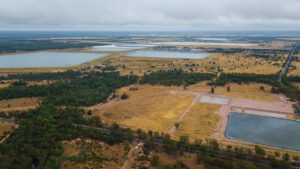Parkway’s technology could be the game changer in Queensland’s huge coal seam gas industry

Parkway is ready to deliver big solutions to the industry. Image: Getty
CEO Bahay Ozcakmak says Parkway is now ready to explore the next phase of its growth to commercialise its technology, and deliver big solutions to the industry.
Since the mid-1990s, coal seam gas (CSG) has grown to become the dominant source of gas in Queensland, comprising over 95% of the gas produced and 99% of the remaining proven and probable gas reserves.
Most of the commercial production of CSG is sourced from the Bowen and Surat basins, the main gas supply for the state’s export LNG industry based in Gladstone.
Consisting primarily of methane, CSG is absorbed into coal and held in place by underground water pressure. To extract it, wells are drilled through the coal seams, which reduces pressure and releases natural gas from the coal.
This however produces vast volumes of highly saline water, otherwise known as brine, an unavoidable by-product of the CSG extraction process.
Over the last decade, the industry as a whole has spent hundreds of million dollars to evaluate solutions to solve this problem, given the only viable alternative identified to date, waste salt disposal, is both deeply unpopular and wildy expensive, given the more than a billion dollar in just waste disposal levies will need to be paid.
“There’s obviously an enormous addressable market and industry-wide opportunity here to come up with a long term solution,” said Bahay Ozcakmak, the CEO of leading water treatment tech company, Parkway Corp (ASX:PWN).
Ozcakmak explained that existing technologies or processes are not sufficient. For example, desalination plants are very common and they can indeed remove salt from saline water to produce fresh water, but they only solve half the problem.
“Producing fresh water is great, but anything that produces fresh water invariably produces waste. In this case, the salts are byproducts and become somebody else’s problem to worry about,” Ozcakmak told Stockhead.
The current operating CSG projects in Queensland are expected to produce in the order of 5 – 6 million tonnes of these highly problematic waste salts, with at least a third of this amount already produced, sitting in brine ponds.
Circular economy
There is increasing scrutiny around this problem like never before, driven by ESG concerns with potential ramifications for companies that are perceived to be doing the wrong thing or at least dragging their feet.
“These days anyone with a smartphone can snap photos of an environmental incident and post them on Twitter, and that could destroy reputations and billions of dollars in business valuations.
“So ESG does play a major role, but I think it’s also the interconnectedness of the world we live in – it’s either you do the right thing now, or you’re going to get caught out, and eventually pay a higher price” said Ozcakmak.
Parkway’s solution to the saline brine problem is its proprietary technology called iBC, which essentially takes the toxic waste brines, recovers fresh water and turns the waste salts into three industrial chemical products for use in the Queensland market – caustic soda for alumina refining, industrial grade salt, and agricultural lime for use on acidic soils in the local farming industry.
“We don’t just treat the brine, we’re actually producing industrial products here and selling them in Queensland. So there’s a whole circular economy angle here too,” he added.
The company has spent millions of dollars developing its portfolio of proprietary brine processing technologies – aligning itself with the leading research organisation in the field, Victoria University, as well as global engineering firm Worley.
About a year ago, Parkway struck a deal with a global player and the region’s largest gas producer, which funded a year-long feasibility study into the technology.
In parallel with the feasibility study, the company also announced a major breakthrough last December, confirming the suitability of the iBC technology to be scaled-up to an industrial scale.
“Over the last 15 years, enormous amounts of efforts have been made to come up with a solution, but to date, no one’s been able to come up with anything that’s acceptable to the industry and certainly nothing that is likely to garner community support,” explained Ozcakmak. The communities in these regions where the CSG projects operate, simply don’t want millions of tonnes of waste salts buried in their backyard.
“We’ve now come out and said that there is an alternative approach, and by using our technology, we’ve demonstrated that we can actually treat this concentrated saline water.”
Inflection point
The breakthrough is highly significant for Parkway. Under current legislation, if a new technology for producing products from the waste brine, that’s technically and commercially viable emerges, all companies that are extracting CSG in Queensland are required to adopt that technology.
“So this has become a big deal for us, because it’s just not a case of Oh, we’ve got an interesting technology.
“This has implications for the whole industry, and how you can solve this problem in other parts of the world,” said Ozcakmak.
Following the announcement, Parkway says that it is now in the middle of developing a ‘master plan’ for how the Queensland CSG industry should treat its residual wastewater problem.
“We’re doing the analysis now, and we’re going to come out later this year with how we think the whole industry should treat the problem,” said Ozcakmak.
The opportunity is potentially huge for the firm, as around 6% of the world’s LNG comes from the three major LNG projects in Queensland.
“This problem, just in Queensland, is worth an estimated more than $300 million a year. One way or another, the CSG industry will incur these costs, there’s simply no alternative.”
Having proved its technology development capabilities and ability to forge commercial partnerships with major global players, Ozcakmak says the company is now ready to explore the next phase of its growth.
“We’re now at a point where we are exploring commercial opportunities to be able to deliver those technologies and create value,” he said.
In the last six to 12 months, the company has been putting together a very experienced team, including the appointment of ex Santos CFO and Coronado exec, Ayten Saridas, as an independent non-exec director.
Last year, Parkway also appointed Stephen van der Sluys as non-exec chairman and independent director of the company. He is a highly credentialed investment banker with extensive experience in Queensland, and was executive director of Queensland Nickel when it floated out of BHP.
Penelope Creswell also joined the company in 2021 as a non-exec director. She is a highly experienced lawyer and is currently Head of Environment & Regulatory Compliance at Cleanaway, Australia’s largest industrial waste company.
“I do genuinely think we’re at the inflection point in really commercialising this technology, delivering big solutions, and creating significant value,” said Ozcakmak.
This article was developed in collaboration with Parkway Corp, a Stockhead advertiser at the time of publishing.
This article does not constitute financial product advice. You should consider obtaining independent advice before making any financial decisions.
Related Topics
UNLOCK INSIGHTS
Discover the untold stories of emerging ASX stocks.
Daily news and expert analysis, it's free to subscribe.
By proceeding, you confirm you understand that we handle personal information in accordance with our Privacy Policy.








